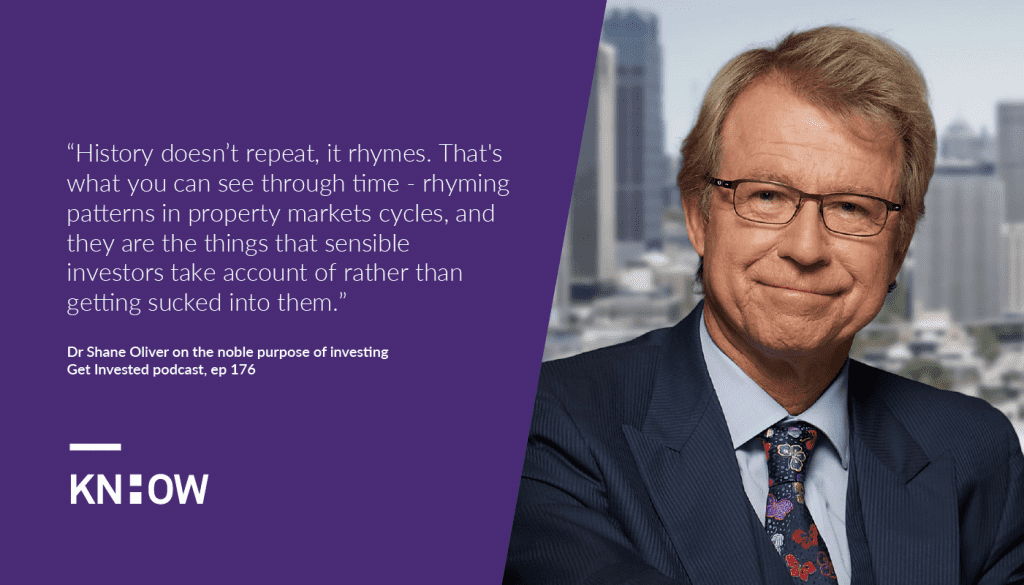Dr Shane Oliver says smart investors will take into account the property and investment market cycles and capitalise on opportunities in market dips.
Dr Oliver is Head of Investment Strategy and Chief Economist at AMP and one of one of Australia’s leading voices on economics and investment.
On the Get Invested podcast with KnowHow’s Bushy Martin, Shane talked about the highs and lows of the property market and warned investors about being emotionally triggered by these fluctuations.
“History doesn’t repeat, but it rhymes. And that’s what you can see through time, rhyming patterns in cycles in the economy, in share markets and in property markets, and they’re the things that sensible investors take account of rather than get sucked into them,” Dr Oliver said.
“And so this affected my thinking as an investor. In 1987, I didn’t have a lot of money saved up so I wasn’t a big investor. But I remember watching the share market collapse, and I thank my lucky stars I didn’t have an ability to go online then and take my money out of superannuation because I might have, but it would have been entirely the wrong thing to do because no sooner than it bottomed, it took off again. And there was a good buying opportunity after that fall.”
It’s because of these experiences that Dr Oliver believes investors should capitalise on investing opportunities in market downturns.
“This affected my thinking going forward, such that whenever I see these events happen, I think I should accelerate my investing when there’s a downswing,” he said.
“It tells me something, if you are an investor, once you see things come down and everyone get really gloomy, there’s an opportunity in there that you shouldn’t ignore. Whereas when you’re at the top, you could be saying, ‘oh this has gone too far, there’s too much debt, there’s too much money in the share market’, but you might find yourself the year after that saying the same thing and then again the year after that etc.”
A big influencer on these decisions can be the opinions of investment experts. However, Dr Oliver said investors should always take these predictions with a pinch of salt.
“The other thing to note is I think it’s harder for investment experts to predict downturns than upswings because a top in the market is a process that can unfold over many, many years and can be very slow,” Dr Oliver said.
“Whereas if you think a bottom is often a deep V in shape – you come down, everyone’s scared, everyone feels horrible, the fall is often very quick … sometimes you can have a bit of a double dip, you come down, have a bit of a bounce, come back and retest and then you take off.
“The bottoming process is a lot quicker than the topping process, and so investment experts often end up with egg on their faces, trying to predict tops as opposed to bottoms. So you’ve got to be careful about that. I know the media love to sort of turn people who predicted the top into gurus, but often times many gurus who may have got the top right usually go through a lot of pain before getting to that point. So much pain in fact that you can end up being wiped out financially.”
Dr Oliver expects growth in Australian markets to continue, albeit at a slower rate.
“Now we’re seeing very strong gains. National property prices, according to CoreLogic, are up 13.5% over the last financial year. That’s the strongest gain since 2004. And I think there’s probably still more to go. I think we’ve still got very low interest rates, there’s ongoing government incentives, we’ve still got a degree of FOMO running through the system, and there’s a lack of stock on the market. The level of listings is pretty low. Positive listings picked up, but they stepped up pretty quickly. So all of those things are saying good gains in markets,” Dr Oliver said.
“But I think we probably passed the peak. The rate of increase will slow down as we go into next year. Affordability is now worsening again, that makes it harder for first time buyers to get in. As prices get higher and higher, it gets harder for owner occupiers to upgrade and so on. Fixed rate mortgage rates have gone up, so the big impetus from the 2% mortgage deals is fading a little bit as those deals become harder to get. And a little bit of a drag might become more evident as long as immigration stays down because you don’t have that population growth driving prices up. So I suspect prices will continue to rise from here, but at a slower rate as we go into next year.”
Listen to the full interview here.
Want to Know How you can build wealth with the help of leading, qualified experts? Talk to the team at KnowHow, now.




